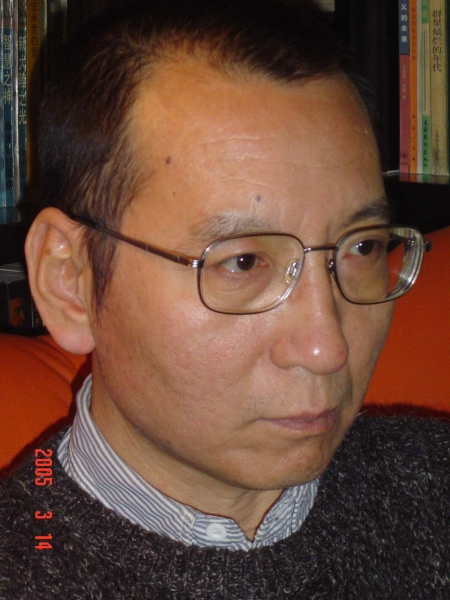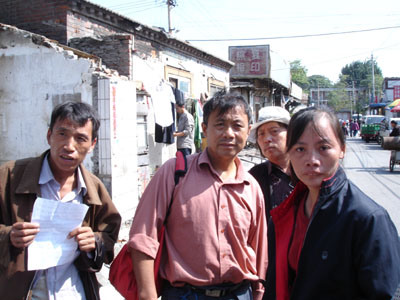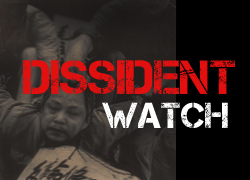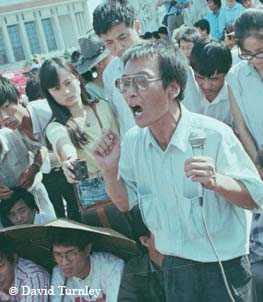UPDATE - TWITTER CAMPAIGN TO FREE LIU XIAOBO CONTINUES
 Due to the overwhelming response we received to our campaign (to date we have 473 follows, hundreds more retweets, and have made it onto 14 Twitter lists), and in protest of Liu's harsh eleven year prison sentence, we've decided to keep the Twitter campaign going! Click here to join the campaign, and watch the LRF website for updates as the campaign progresses!
Due to the overwhelming response we received to our campaign (to date we have 473 follows, hundreds more retweets, and have made it onto 14 Twitter lists), and in protest of Liu's harsh eleven year prison sentence, we've decided to keep the Twitter campaign going! Click here to join the campaign, and watch the LRF website for updates as the campaign progresses!
395 Join the Twitter Campaign to Free Liu Xiaobo
To mark the one year anniversary of Chinese dissident Liu Xiaobo's detention, the Laogai Research Foundation ran a ten-day Twitter campaign to advocate for Mr. Liu's release. The campaign is now over, and we are pleased to report that 395 people, the majority of whom were Chinese, joined our campaign! We will now send letters demanding Mr. Liu's freedom to Chinese President Hu Jintao, the Chinese Embassy in DC, and the Supreme People's Procuratorate of China (the judicial organ responsible for Mr. Liu's case). We will also send a copy to President Obama. A copy of the letter can be seen below.
We would like to thank everyone who participated in this campaign. LRF founder Harry Wu was freed in 1995 due to international advocacy, and that is why we have reason to hope that continued international pressure will lead to Liu Xiaobo's release.
Some of our favorite tweets:
@junius4th: (translated from Chinese) It's nearly one year since Charter 08 was released, but perhaps most Chinese haven't heard of it. Support @FreeLiuXiaoBo, or search on Google for a full text of the Charter. It will teach you how to be a citizen.
@tianxyx: (translated from Chinese) Upon seeing the ID @FreeLiuXiaoBo, what came into my mind immediately is a scene from the movie A Time to Kill, in which two groups of people assembled outside the court, one chanting "Free Carl Lee" and the other "Fry Carl Lee," quite similar to people's responses to the Deng Yujiao case.
@Taylor_West: Interested in Twitter as a tool for human rights in repressive regimes? See http://is.gd/5isGb and @freeliuxiaobo, & pls RT. about 20 hours ago from Seesmic
@mashaofang: @freeliuxiaobo:(translated from Chinese) A summary of Charter 08: Financial and tax reform; A federated republic; Separation of powers; Public control of public servants; Election of public officials; Legislative democracy; An independent judiciary; Rule of law; Guarantee of human rights; Protection of the environment; Social security; Rural–urban equality; Truth in reconciliation; Civic education; Amending the Constitution; Freedom of association; Freedom of assembly; Freedom of expression; Freedom of religion; Protection of private property
Advocacy Letter:
December 8th, 2009, marks the one year anniversary of the detention of Liu Xiaobo. December 10th marks the one year anniversary of the release of Charter 08, the remarkable document calling for improved human rights and peaceful, democratic political reforms for which Mr. Liu so courageously sacrificed his freedom.
To honor these anniversaries—one tragic, one hopeful—the Laogai Research Foundation launched a ten-day Twitter campaign in support of Mr. Liu. In just ten days, 395 people joined this campaign to demand Liu Xiaobo’s freedom. On behalf of all of those who participated in this campaign, we are writing to express our deep concern and outrage over the continued imprisonment of Liu Xiaobo, and to demand his immediate release.
Liu Xiaobo is an internationally respected scholar, author, and literary critic. He has worked tirelessly for decades to improve the lives of his fellow Chinese. I am saddened that your government has arrested such a remarkable and talented scholar as Mr. Liu. The Chinese government should be celebrating the ingenuity, creativity, and compassion of the Chinese people, and commending those who work selflessly to improve society. President Hu and Premier Wen repeatedly call on the Chinese people to bring about a “harmonious society.” But when a brave man such as Liu Xiaobo actively works to bring about a freer and more harmonious society, the government’s response is fear and repression.
We urge you to unconditionally release Liu Xiaobo, whose only crime has been to peacefully call on the government to live up to its international commitments, and indeed its own constitution, by respecting the universal human rights of the Chinese people.
 In the United States and much of the rest of the developed world, human rights and climate change aren’t usually treated as related issues. In China, though, they are intimately intertwined, and policymakers meeting in Copenhagen this week would do well to realize the connection. Copenhagen will be dealing with China’s climate issues at the macro level. They’ll be talking to central government ministers, trying to get an agreement from Beijing. But they’ll miss out on the bigger picture. China has no freedom of speech, no independent judiciary, and a huge corruption problem. That’s a pretty toxic mix. These problems will make enforcement of any agreements difficult at best, and impossible at worst. Adam Minter has written on several occasions about the
In the United States and much of the rest of the developed world, human rights and climate change aren’t usually treated as related issues. In China, though, they are intimately intertwined, and policymakers meeting in Copenhagen this week would do well to realize the connection. Copenhagen will be dealing with China’s climate issues at the macro level. They’ll be talking to central government ministers, trying to get an agreement from Beijing. But they’ll miss out on the bigger picture. China has no freedom of speech, no independent judiciary, and a huge corruption problem. That’s a pretty toxic mix. These problems will make enforcement of any agreements difficult at best, and impossible at worst. Adam Minter has written on several occasions about the 
 Tibetan singer Tashi Dondrup was detained late last week, accused by Chinese authorities of "composing subversive songs."
Tibetan singer Tashi Dondrup was detained late last week, accused by Chinese authorities of "composing subversive songs." Have you joined LRF's campaign to free Liu Xiaobo? If not, check it out
Have you joined LRF's campaign to free Liu Xiaobo? If not, check it out